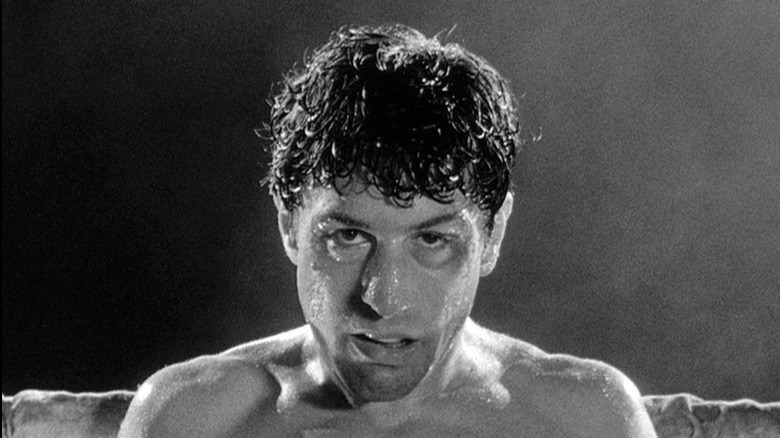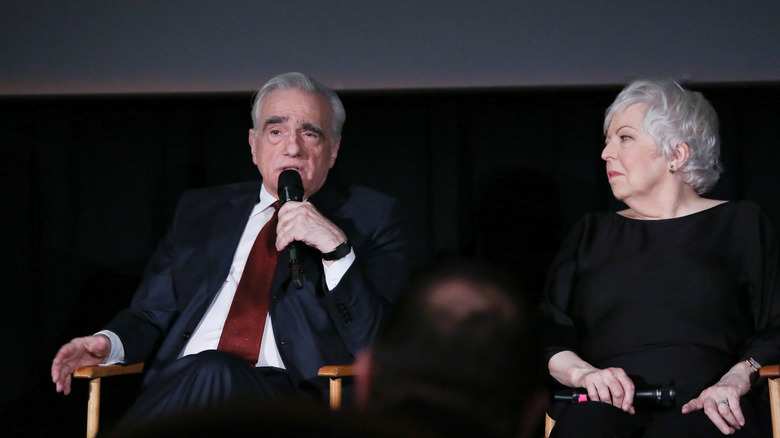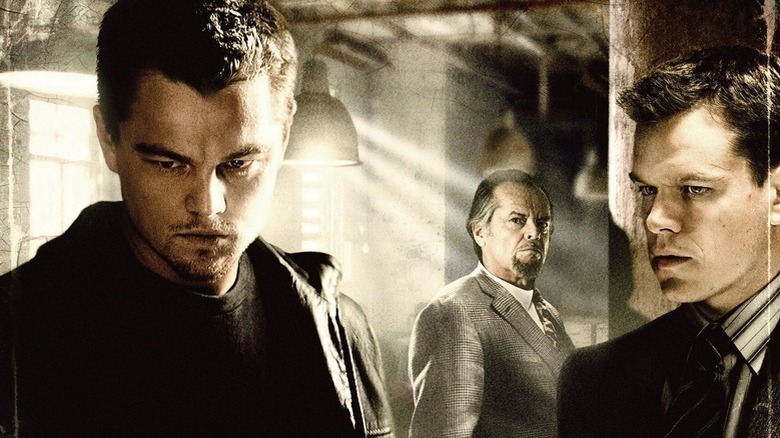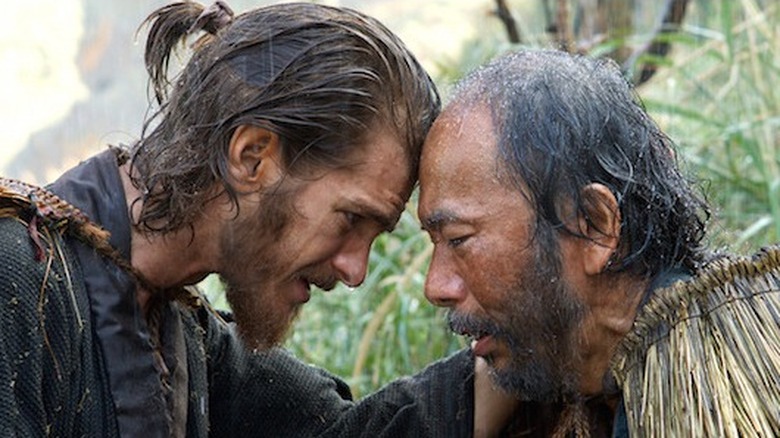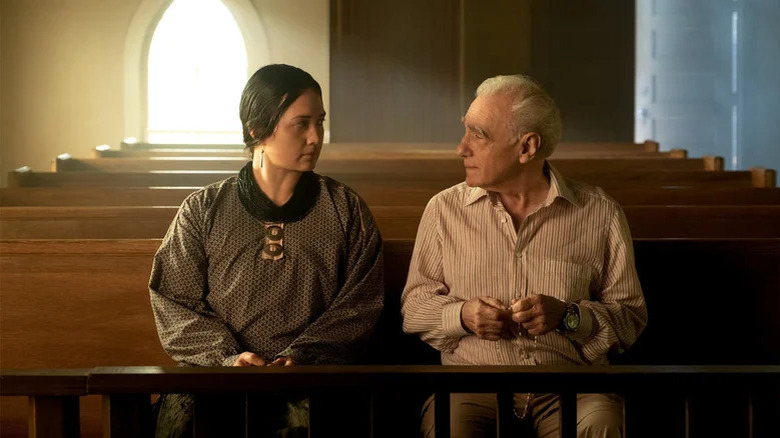Why An Oscar Win For Martin Scorsese's Raging Bull Devastated Thelma Schoonmaker
If Martin Scorsese is the greatest living filmmaker, then Thelma Schoonmaker is the greatest living film editor. It takes great craft and an understanding of film rhythm to assemble threeish-hour cuts that never run out of energy, and that's what Schoonmaker has done time after time with "Goodfellas," "The Departed," "The Wolf of Wall Street," and so forth.
Scorsese and Schoonmaker are an inseparable creative duo; they've been working together for more than 50 years. They met at New York University in the 1960s and she edited his feature debut, "Who's That Knocking at My Door." Schoonmaker has since edited every film that Scorsese directed going back to 1980's "Raging Bull." That hiatus in the 1970s wasn't due to a falling out; it was because Schoonmaker wasn't willing to play ball with member requirements for the Motion Picture Editors Guild. Specifically, the Guild demanded an aspiring member spend eight years total as an apprentice/assistant, even though Schoonmaker was already Oscar-nominated for editing the 1970 documentary "Woodstock."
For "Raging Bull," Schoonmaker took home the Best Film Editing Oscar, one of two the film won (the other was Best Actor for Robert De Niro as Jake LaMotta). However, as Schoonmaker recounted in a new interview with Total Film magazine, she felt only sorrow that night — because Scorsese, who lost his first Best Director nomination, couldn't share in her glory.
Raging Bull is snubbed
The Academy will sometimes split the difference between Best Director and Best Picture by giving the former to the Best Picture runner-up (see 2017, where "Moonlight" got Best Picture and Damien Chazelle won Best Director for "La La Land"). Other times, they'll go all-in on a single film (see "Parasite," "The Shape of Water," "Birdman," etc.). The 53rd Academy Awards was the latter. Robert Redford's "Ordinary People" took home Best Picture and Best Director, knocking "Raging Bull" out of the ring.
For a director, these sorts of results have to sting a bit. The film you made, featuring the performance you directed, gets honored but you don't. In a remarkable display of empathy for Scorsese, Schoonmaker called March 31, 1981, "One of the saddest nights of my life" — not what you'd expect to hear from someone who won their first Oscar.
Part of it is because Scorsese was an active partner to Schoonmaker in cutting the movie. He didn't just provide the dailies that Schoonmaker cut into dynamite in her editing bay, he mentored her and they made a masterpiece together. Even though Schoonmaker got the sole editing credit on "Raging Bull," she felt indebted to Scorsese:
"I wanted to give him my Oscar. I learned so much on 'Raging Bull.' Marty was teaching me constantly. And the brilliant camerawork, the changing of speeds, the cutting... it's just phenomenal."
Scorsese spent the 20th century infamously overlooked by the Academy; "Goodfellas" losing Best Picture of 1990 to "Dance With Wolves" (and Scorsese losing Best Director to Kevin Costner) is another decision that's been harshly scrutinized since.
The Departed brings it home
It wasn't until 2007, at the 79th Oscars, that Marty finally prevailed; he won Best Director for "The Departed," which also got Best Picture. On February 25, 2007, he stood in the same shoes that Redford and Costner had decades earlier.
Remember, the filmmaking world had evolved around the Academy in the two-and-a-half decades between "Raging Bull" and "The Departed." Scorsese, discussing the "totally inadvertent" win and his surprise with The New Yorker in 2023, noted that, "It's a different Academy from when I was starting." Whereas the members who decided "Ordinary People" over "Raging Bull" may have seen Scorsese as an up-and-comer, to those voting on "The Departed," he was a patron of cinema.
Scorsese winning for "The Departed" was not entirely about the movie itself; it was a convenient chance to convey the respect he'd earned over a lifetime. That's why a trio of his old friends — Steven Spielberg, George Lucas, and Francis Ford Coppola — were recruited to be Best Director presenters that year, to make his win all the sweeter.
Silence from the Oscars
Schoonmaker herself also took home another Best Editing win for "The Departed," an acknowledgment of how her talents complete Scorsese's and vice versa. However, as she explained to Total Film, she felt more skeptical about her wins than honored:
"I do notice that the things I've gotten nominations for tend to be more active ... action. Like 'Raging Bull,' 'The Departed.' Things like 'Silence' are not [...] I do think there are certain characteristics of movies that win Oscars."
"Silence" was a 2016 film about two Catholic priests in 17th-century feudal Japan, where Christianity was banned (it's based on a novel by Shūsaku Endō). It's a meditative drama, echoing Scorsese's previous film "The Last Temptation of Christ," and lacks the propulsiveness and humor of Scorsese's deceptive crowdpleasers like "Goodfellas" (Scorsese always shows the highs only to hammer in the fall). If "Silence" feels slow, it's because it asks you to sit with its characters as they contemplate heavy questions: what's more Christlike, holding onto your faith or apostatizing to save others?
"Silence" was overlooked by the Academy; only Rodrigo Pieto was nominated for Best Cinematography. Scorsese's two films since, "The Irishman" and "Killers of the Flower Moon," are definitely closer in pace to "Silence" than other Scorsese films that have triumphed at the Oscars. "The Irishman" got 10 nominations but no wins.
Scorsese and the Academy
We'll soon know if "Killers of the Flower Moon" (also nominated in 10 categories) follows suit, but it has broken at least one record.
Due to "Killers of the Flower Moon," Scorsese now has the most Best Director nominations of any living filmmaker. Does he feel at all bitter about his 10:1 ratio of nominations to wins? Judging by what Schoonmaker had to say, I'd wager no; she told Total Film that he has a lot of patience for dealing with the suits and politics that run Hollywood:
"Marty has a way of dealing with studio people that is very good. He doesn't get angry with them — Michael [Powell, Schoonmaker's husband] would, he'd get angry and storm out the room — but Marty never does that. He finds a way to try and open the mind, if possible, by saying things like, 'That's a good idea, but I couldn't make that movie.' In a nice way so no one gets insulted."
So yeah, I'd say Scorsese would much rather make his movies than ones that win Oscars. If the Academy continues taking his brilliance for granted, that's their problem.
